Djibouti Travel Guide
This is a Djibouti Travel Guide from taste2travel.
Date Visited: March 2023
Introduction
Djibouti has been a country which has fascinated me for many years. I’d never met anyone who had travelled there and it was a complete mystery.
When I told friends and family that I was heading to Djibouti, they had no idea that such a country even existed! It is a tiny little country, tucked away in a remote corner of eastern Africa, yet it occupies a strategic location at the entrance to the Red Sea.
The official languages of Djibouti are French and Arabic, with Somali and Afar also widely spoken.
The country has a predominantly Muslim population, with Islam being the official religion. Despite this, a sizable French expat population ensures that items such as pork and alcohol are available on restaurant menus.

Djibouti is strategically located at the entrance to the Red Sea.
Djibouti is so strategically located that several countries (France, the United States, and China) maintain military bases there.
The United States military maintains its only African base in Djibouti. This base, Camp Lemonnier, recently made news headlines when it was used for the airlifting of US diplomats out of Khartoum.

Exploring the quiet countryside of Djibouti requires either a rental car or a car with a driver.
Although not a cheap travel destination, quiet, unassuming, little Djibouti is a surprising travel destination – a country of very friendly, and welcoming, inhabitants who always made me feel welcome.
The main expenses will be accommodation and tours. With a lack of public transport in the countryside, you will need to either rent a car or hire a car with a driver to reach most sights.

A salt-encrusted animal skull, at a souvenir stand at Lake Assal.
Due to its unique location at the meeting point of three tectonic plates, the country offers some astounding scenery in the form of Lake Assal and the surrounding volcanic field. This is a country whose geography is still a ‘work in progress’.

A highlight of Djibouti, Lake Assal is a two-hour drive west of Djibouti City.
Djibouti has a hot and arid climate, with temperatures often reaching up to 45°C during the day. I visited during the month of April which was ideal with temperatures around 30°C.

One of several fissure vent volcanoes which were created during the November, 1978 eruption in the area around the Ardoukoba volcano.
Djibouti is an interesting destination which can easily be covered in 7-10 days, although tours to remoter regions are pricey!

My Guide, Akram, exploring one of the small lava tunnels which was formed during the eruption of the Ardoukoba volcano.
Location
Djibouti is located in the Horn of Africa, on the eastern coast of the continent. It is bordered by Eritrea to the north, Ethiopia to the west and south, and Somalia to the southeast.

Due to its strategic location at the entrance to the Red Sea, Djibouti is a major trans-shipment port.
Djibouti is situated at the entrance to the Red Sea and is strategically located at the crossroads of one of the world’s busiest shipping lanes, making it a hub for international trade and commerce. It serves as a major trans-shipment port.
The country has a coastline of approximately 300 km and covers a total land area of 23,200 square kilometres (8,957 square miles), which makes it about the size of the US state of New Jersey.
Tectonic Location

This map shows Djibouti’s location at the tri-point of three tectonic plates.
Source: Wikipedia
Just as important is Djibouti’s tectonic location, which has shaped, and continues to shape, the country in every way!
The country is situated near a tectonic triple junction where three tectonic plates meet – African, Arabian, and Somali.
Due to a westward rift movement between the Arabian and Somali plates, the Gulf of Tadjoura has formed over millions of years, which affectively slices Djibouti into two halves.

A map of Djibouti showing the Gulf of Tadjoura which will cut further inland over time. Source: https://www.worldatlas.com/maps/djibouti
Just to the west of the Gulf, Lake Assal lies in a depression at -155 m (509 ft) below sea level, making it the lowest point on the African continent and the third lowest point on earth.
Over the next millions of years, this rift movement will result in the earth’s surface sinking further with Lake Assal eventually becoming part of the sea bed for a much larger Gulf of Tadjoura.

A view of Ghoubbet Bay, and lava fields, near Lake Assal.
Fast forward tens of millions of years into the future and this rifting will eventually split Djibouti into two sections and could leave Ethiopia with a coast of its own.
People

An Afar souvenir seller at Lake Assal, trying to sell me a chunk of Obsidian.
As of 2023, Djibouti has a population of about 1,035,000 people, with more than half (600,000) of the population residing in Djibouti City – the capital and only city of any real size.
The largest ethnic group in Djibouti is the Somali people, who make up about 60% of the population. The Afar people, who are mainly found in the northern part of the country, make up about 35% of the population.
Most of the people in Djibouti practice Islam, which is the official religion of the country. Arabic and French are the official languages, but Somali and Afar are also widely spoken.
Military Personnel
Due to its strategic location, Djibouti is home to a number of military bases. As of 2,021 – 4,000 U.S. Army troops, 1,350 French Army troops, 600 Japanese Army troops, 400 Chinese Army troops, and an unknown number of German Army troops were stationed at various bases throughout Djibouti.
Tour Companies

When I first arrived at Djibouti Airport from Addis Ababa, I was offered a ride into town to my hotel by some friendly locals who were collecting a friend from the same flight.
One of the passengers in the car, Ahmed, runs a tour company called Zo Voyages. He offered to arrange any tours for me while I was in Djibouti.
It was Ahmed who arranged for his friend, Akram Saleh (a freelance driver and guide), to take me to Lake Assal. This was a great day trip!
If you need the services of a tour company while in Djibouti, I can recommend Ahmed, who you can contact at the following:
- Telephone / WhatsApp: +253 77 09 30 12
- Email: administration@zovoyage.com
Flag

The flag of Djibouti.
The flag of Djibouti has two equal horizontal stripes – the top stripe is blue and the bottom stripe is green.
In the centre of the flag, there is a white isosceles triangle with its base along the hoist side. Inside the white triangle, there is a red, five-pointed, star.

The Djiboutian flag flying at the Djibouti Palace Kempinski hotel.
The blue stripe on the flag represents the sea, the green stripe represents the land, and the white triangle represents peace. The red star in the centre of the flag represents unity.

Djibouti flags for sale at a shop in Djibouti City.
The current design of the flag was adopted on June 27, 1977, when Djibouti gained its independence from France.
Currency

In the style of the former French franc, Djiboutian franc bank notes are especially large.
The Djiboutian franc (International Code: DJF) is the official currency of Djibouti. The currency, which is issued by the Central Bank of Djibouti, was introduced in 1949 to replace the French franc, which was used during the colonial era.
The Djiboutian franc is subdivided into 100 centimes. However, due to the low value of the currency, centimes are rarely used in practice, and most transactions are rounded to the nearest franc.

The highest denomination note, the DJF 10,000 bank note is worth US$56.20.
The banknotes in circulation in Djibouti come in denominations of 1,000, 2,000, 5,000, and 10,000 francs. The coins in circulation are in denominations of 1, 2, 5, 10, 20, 50, 100, and 500 francs.
Exchange Rate
The franc is pegged to the US dollar at the rate of US$1 = 177.721 DJF
You can verify the current rate here.
Oversized Bank Notes

A set of uncirculated 2,000 DJF bank notes which I acquired from a local bank.
For visitor’s who remember the days of the old, over-sized, French franc bank notes, the large Djiboutian franc bank notes will bring back memories.
I could never get them to fit in my wallet and they are way too big for the draws of cash tills. Cashiers have to squash them into the till draws, so they are always creased, crushed and generally messy.

A set of uncirculated 2,000 DJF bank notes which I acquired from a local bank.
If you wish to acquire a note in pristine condition, you will need to ask at a local bank, where I always found the staff to be friendly and helpful.
Money Matters
In terms of hard currency, (i.e. USD cash), travelling in the Horn of Africa can be problematic. In countries such as Ethiopia and Eritrea, the purchase of hard currency is illegal, yet many payments (visa’s etc.) need to be made in USD cash.
If travelling to Eritrea, you will need to carry enough USD cash to cover all expenses since credit cards are not accepted anywhere.
If travelling in Ethiopia, you can affectively halve all costs by changing USD cash “unofficially”.
Officially in Ethiopia, USD$100 = 5,400 ETB while on the black market, USD$100 = 10,000 ETB (as of March 2023).
Unofficial transactions should never be conducted on the street, but in a safe, secure, indoor environment, such as a hotel lobby.
ATMs

Dual currency ATMs, which dispense both DJF and USD cash, can be found everywhere in Djibouti city.
The good news is that ATMs in Djibouti dispense both DJF and USD cash. Djibouti is a great place to replenish your reserves of USD cash!
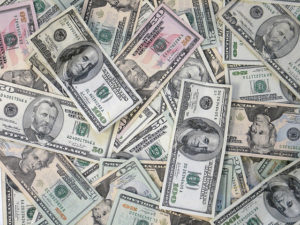
All common credit cards are widely accepted at ATMs in Djibouti, including Mastercard, Visa and even American Express.
Hallelujah!
SIM Cards

Djibouti Telecom is the only telco in Djibouti.
Telephone and internet services in Djibouti are provided by the government owned, monopoly operator – Djibouti Telecom.
Generally, I found wi-fi speeds to be painfully slow in Djibouti, with an average speed of just 2Mbps!
Patience is required!
You can easily purchase a local SIM card from the Djibouti Telecom store which is located inside Bawadi Mall. You will need to bring your passport.
I purchased a tourist SIM card, for DJF 1,000 (US$5.62) which was valid for 3 days and offered 500 DJF call credits and 5 GB of data.
Travel Costs
Not cheap!
Which is not surprising, since most former French colonies are expensive! The biggest expense will be accommodation and any tours.
Sample costs:
- Coca Cola (0.33 litre bottle): DJF 120 (US$0.67)
- Water (0.33 litre bottle): DJF 170 (US$0.96)
- Glass of Beer: DJF 1,000 (US$5.62)
- Cappuccino: DJF 500 (US$2.81)
- Taxi within downtown Djibouti City: DJF 500 (US$2.81)
- Car Rental from Atlantic Hotel: US$50 per day
- Day trip to Lake Assal: US$200+
- Litre of fuel: DJF 240 (US$1.35)
- Meal (inexpensive restaurant): DJF 2,000 (US$11.24)
- Meal (mid-range restaurant): DJF 5,000 (US$28)
- Budget guest house (room for 2): Djib Guesthouse = US$70
- Mid-range hotel (room for 2): Atlantic Hotel = US$160
- Top-end hotel (room for 2): Djibouti Palace Kempinski = US$400
Sightseeing
During my time in Djibouti, I explored Djibouti City and the sights around Lake Assal. I was also keen to visit Lake Abbe, but with a 2-day tour costing US$600, I decided to pass.
Djibouti City
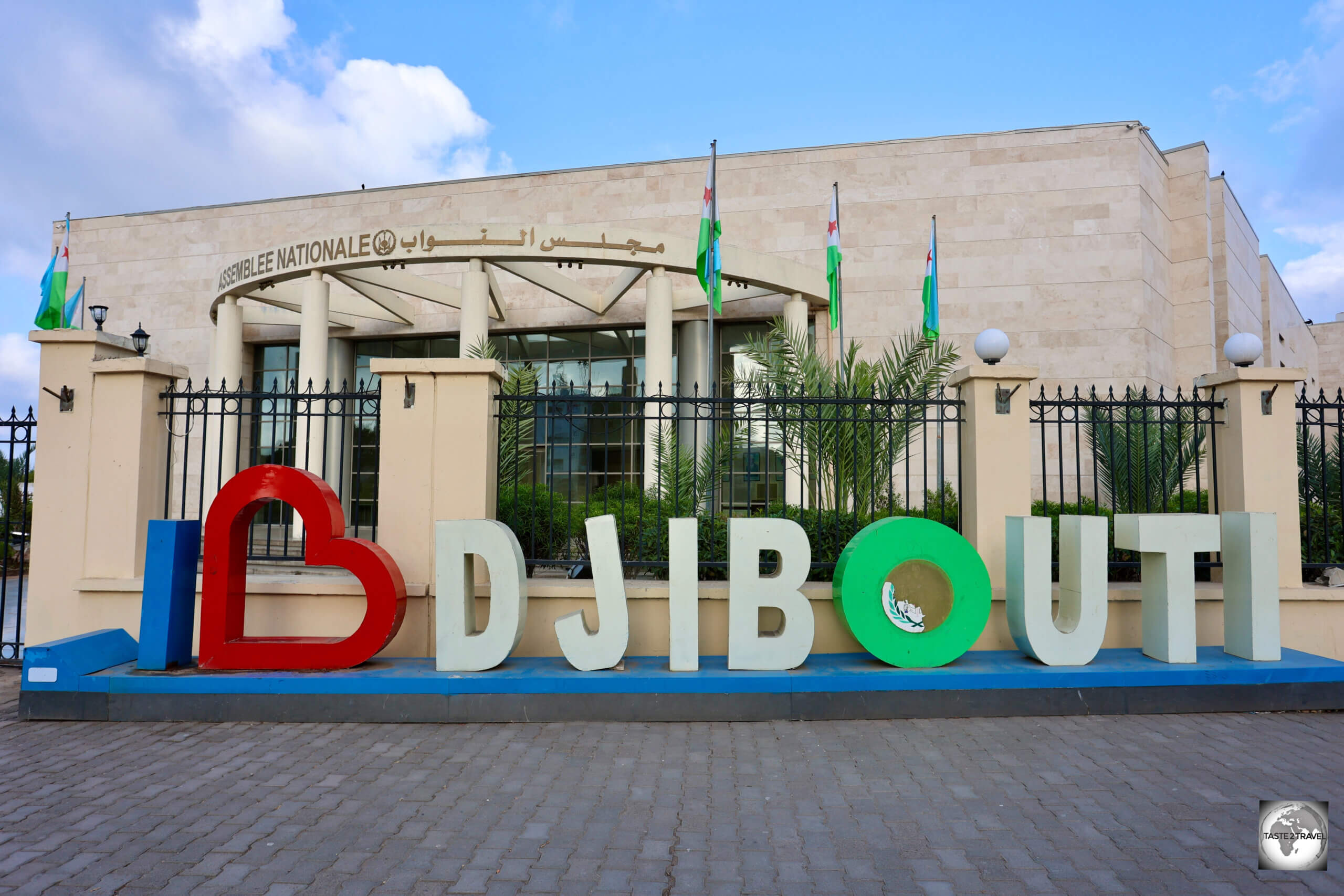
“I Love Djibouti”, outside the Djibouti National Assembly (parliament).
Overlooking the Gulf of Tadjoura and the Red Sea, Djibouti City is the capital and largest city of Djibouti. Home to 600,000 souls, Djibouti is a small, relaxed, laid-back capital which is easily covered on foot.
Djibouti city is a melting pot of various ethnic groups, including Somali, Afar, Arab, and French, which creates a unique blend of cultures.
As of 2021, there were an estimated 34,005 refugees and asylum seekers in Djibouti, with the top countries of origin being neighbouring Somalia (14,132) and Ethiopia (12,742).
The locals are generally friendly and crime rates are low. I spent more than a week in the city and never felt threatened or unsafe. Walking around in the evening isn’t a problem. People generally are courteous and kind. They were happy to see a tourist!

A post box in the European Quarter of Djibouti City.
Despite being the cultural, economic, and political centre of Djibouti, there are few sights of interest for tourists. Rather, the charm of Djibouti lies in its crumbling colonial-era buildings which line the streets of the European Quarter, a district which is pleasant to explore.
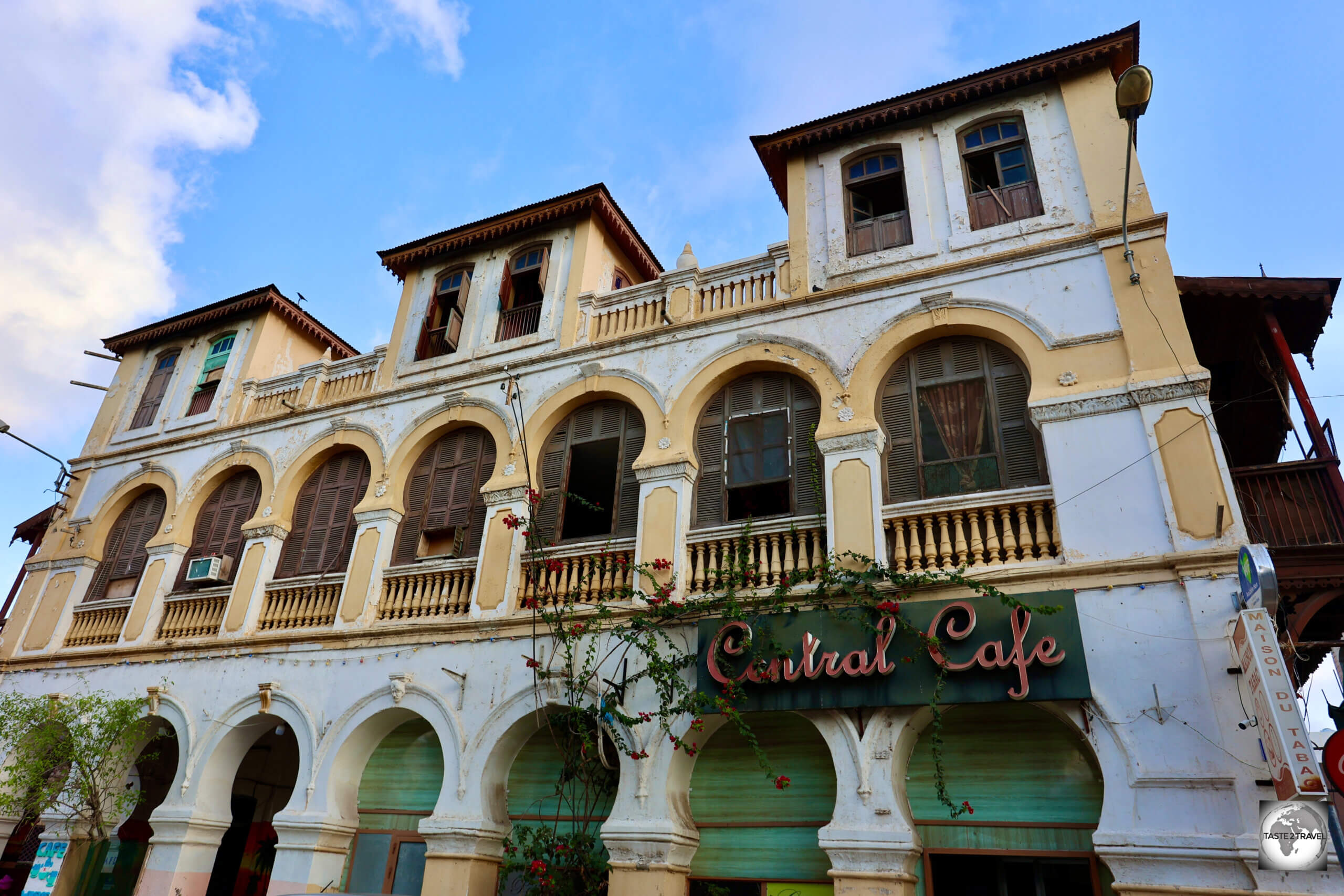
A typical colonial-era building in Djibouti’s European Quarter.
The focal point of the European Quarter is Place du 27 Juin 1977 (Place Ménélik). With its whitewashed houses and Moorish arcades, this vast square is a strange mix of the Arab and the European. It’s lined with cafés, bars, restaurants and shops.
The historic city centre of Djibouti was constructed during the French colonial period using madrépore, a relatively friable limestone. Most of the buildings were designed and built in the distinctive French colonial architecture style.

A colonial-era building in the European Quarter of Djibouti City.
To the south of the European Quarter, the African Quarter is much messier and more chaotic. This is where many locals live in rudimentary housing.
Lake Assal

A view of Lake Assal, the lowest point in Africa and the third lowest point on Planet Earth.
Lake Assal is a saline lake located in the central-western part of Djibouti, about a 2-hour drive west from Djibouti City.

Due to ongoing ‘rifting’, Lake Assal will one day be inundated by the nearby Gulf of Tadjoura.
The lake is situated in the Danakil Desert and is one of the most unique and beautiful natural wonders of the country.

A view of Lake Assal, Djibouti.
Due to a westward rift movement between the Arabian and Somali plates, the nearby Gulf of Tadjoura is slowly pushing further west and will one day inundate the area now occupied by Lake Assal.

A view of Lake Assal, a future sea bed in the making.
Essentially, Lake Assal is a future sea bed, currently being formed on land. One day, as the tectonic plates separate further, the lake will be inundated by the encroaching Gulf of Tadjoura.

Lake Assal is a 2-hour drive west of Djibouti City on good sealed roads.
The lake is approximately 155 metres (508 ft) below sea level, making it the lowest point in Africa and the third lowest point on earth.

Any metallic surfaces simply rust in the corrosive air of lake Assal.
It is also considered one of the most saline bodies of water in the world, with a salt concentration of up to 10 times higher than that of the ocean.

A view of Lake Assal, a highlight of Djibouti.
The lake is surrounded by majestic and rugged landscapes, including volcanic formations and rocky hills.

An Afar souvenir seller at Lake Assal wanted to sell me this Obsidian boulder for US$50! It was far too heavy to carry!
The shores of the lake are coated with a thick layer of white salt, creating a stunning contrast with the deep blue color of the water.
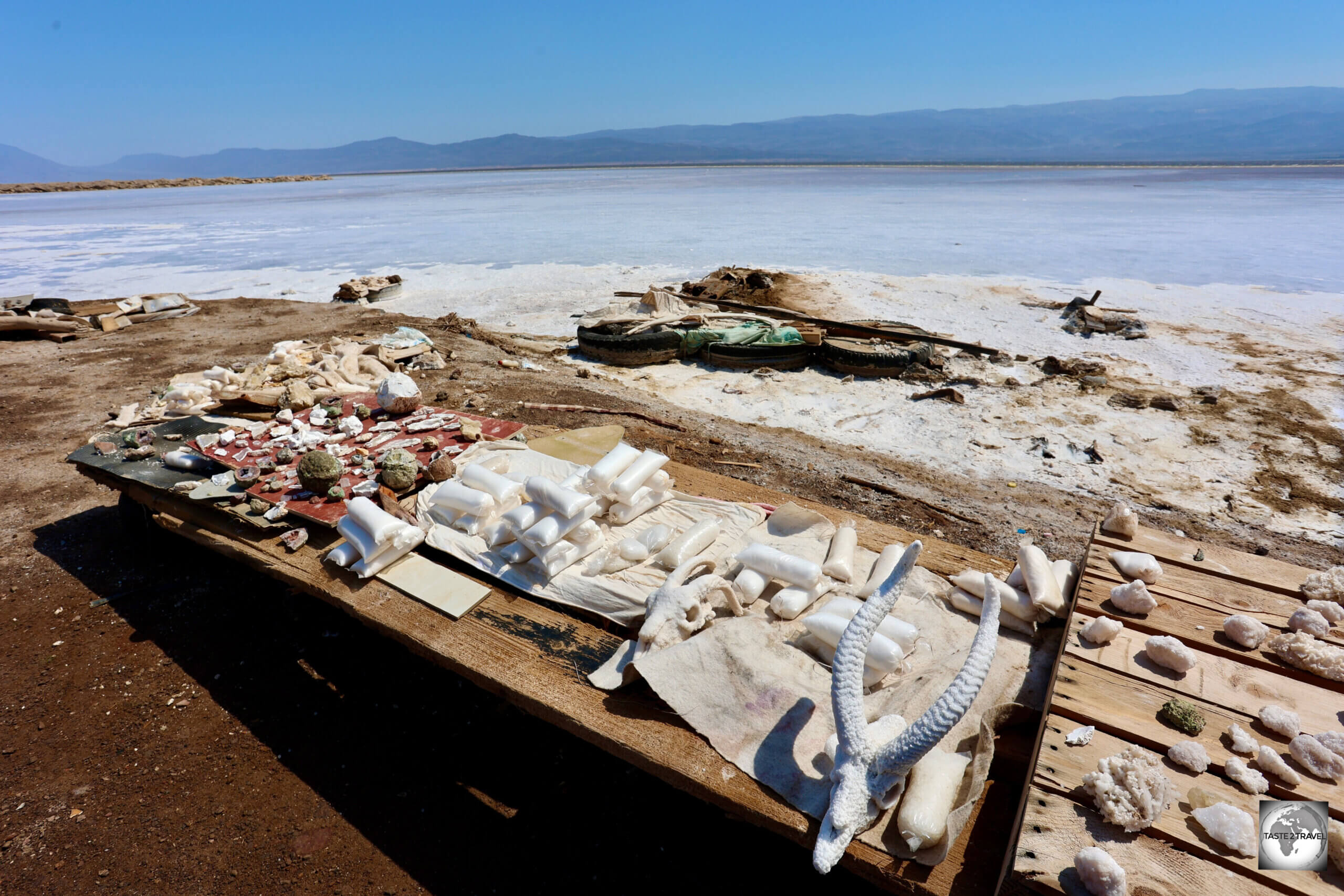
Bags of salt, and salt-encrusted animal skulls, for sale at a souvenir stand at Lake Assal.
Overall, Lake Assal is a true natural wonder and a must-visit destination for anyone traveling to Djibouti and definitely worth the US$200 tour cost.

A view of the Gulf of Tadjoura near Lake Assal.
Salt Mining

A Chinese-funded salt works, which is located on the shores of Ghoubbet Bay, near to Lake Assal.
With more than six million tonnes of salt being deposited in the area every year, and the thickness of Assal’s crust varying between 20 and 80 metres, this is a resource which mankind could not simply ignore.
Enter the Chinese (no surprise), who have established a salt processing plant on the shores of Gulf of Tadjoura. From here salt is exported directly to China.
Djibouti’s Grand Canyon

Djibouti’s Grand Canyon, actually Belvedere Sul Canyon, is located at a point where three tectonic plates are pulling apart – i.e. rifting.
Djibouti’s Grand Canyon, which is called Belvedere Sul Canyon, is located at a point where three tectonic plates (Africa, Arabia and Somalia) are slowly pulling apart – i.e. rifting.
This is an impressive sight and shows the full effect of ‘rifting’. The canyon is located on the right-hand side of highway RN9, as you drive towards Lake Assal.

My freelance driver/ guide – Akram Saleh – who is a competent driver and very knowledgeable guide, parked at the Grand Canyon car park.
Freelance Tour Guide
I toured Lake Assal with Akram Saleh, who is a very knowledgeable guide and a very good driver.
His fee for the day trip to Lake Assal was US$200.
If you wish to organise a tour, Akram can tailor any tour to suit your needs. You can contact him on Instagram at:
https://www.instagram.com/akram_persie/
Ardoukoba Volcanic Area
The area around Lake Assal is ‘ground zero’ for tectonic plate movements and a hotbed of geographical activity, with the landscape dominated by, the recently erupted, Ardoukoba volcano.

Basaltic lava fields, which were created during the eruption of the Ardoukoba volcano in 1978.
The Ardoukoba volcano is fed by rift magma which emanates from a volcanic fissure which is part of the Great Rift Valley fault system.

The road through the Ardoukoba volcanic lava field winds its way past recently erupted volcanoes and around basaltic lava flows.
As a result of the most recent eruption in November of 1978, basaltic lava flows cover the landscape. Also present are fumaroles, lava tunnels and deep fissures.

Straddling a tectonic divide with one foot on the Africa plate and one on the Arabian plate, one of many features in the vicinity of the Ardoukoba volcano.
It all makes for fascinating sightseeing!

My Guide, Akram, exploring one of the small lava tunnels which was formed during the eruption of the Ardoukoba volcano.
The Government of Djibouti has initiated a proposal with UNESCO to declare the Lake Assal zone including the Ardoukoba volcano and its surroundings as a UNESCO World Heritage Site.
Video:
My Guide, Akram Saleh, made a fumarole smoke by inserting his cigarette into the gaseous crevasse – a simple but effective chemistry lesson!
Eating Out

There’s no shortage of cafes, restaurants and bars in Djibouti City.
The cuisine of Djibouti is similar to the cuisine of neighbouring countries such as Ethiopia. The same staples, such as Injera, tibes etc. are served in Djibouti.
Due to the French influence and the presence of French expats, it’s also possible to enjoy some fine French cuisine while in Djibouti City.
Restaurants
Djibouti City is home to many local, budget restaurants and some fine dining options which are owned by French expats.
Some of my favourite dining options in downtown Djibouti City:
Menelik Hotel – Restaurant Tadiourah
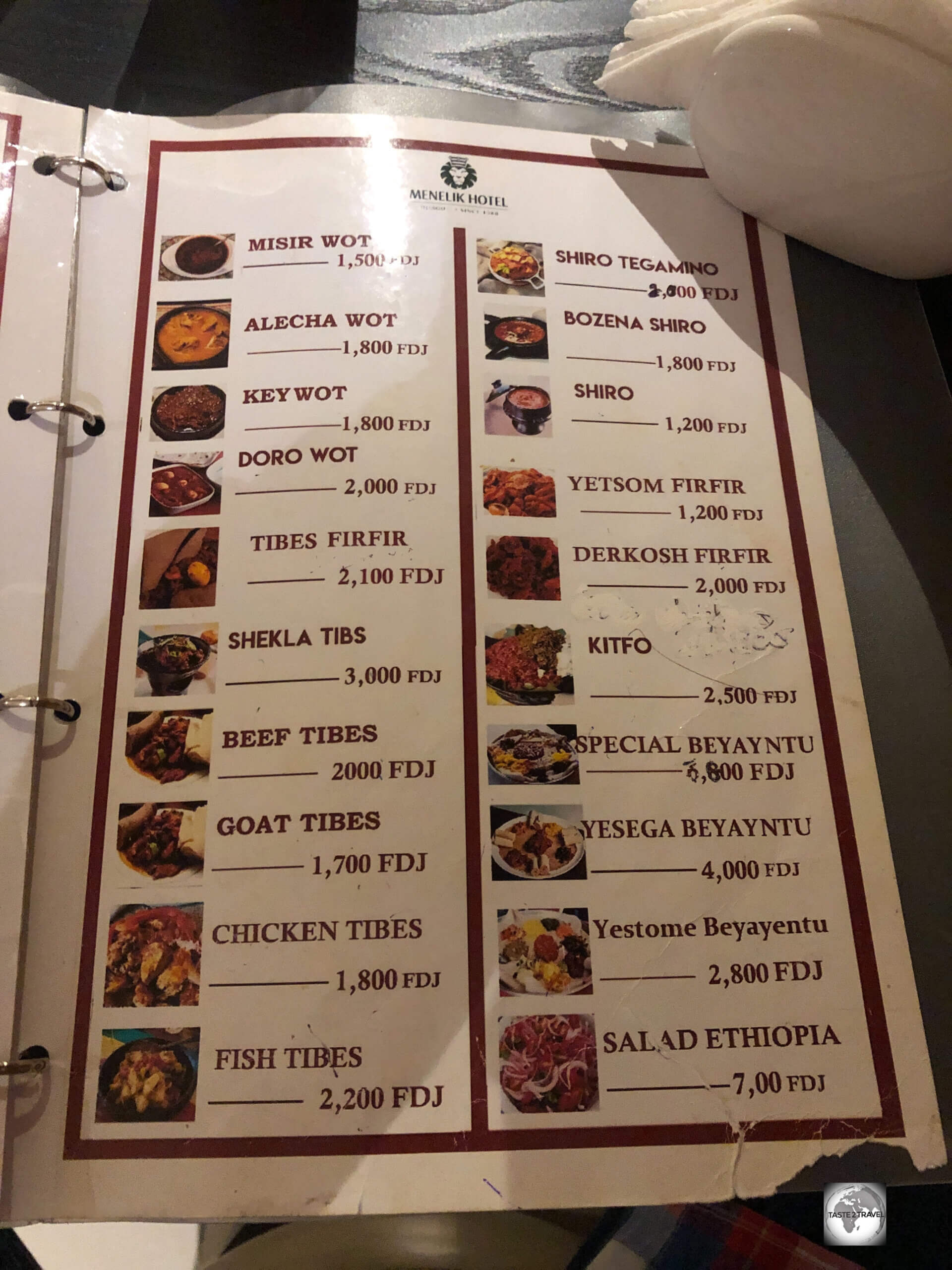
Menu at Restaurant Tadiourah at the Menelik Hotel in Djibouti.
Located on the 1st floor of the Menelik hotel in downtown Djibouti City, the Restaurant Tadiourah is a reliable standby which serves both international and local cuisine.
I was in town during Ramadan, and was happy that this restaurant, which is hidden away inside the hotel, was always open and never stopped serving meals. It’s a favourite haunt for visiting Ethiopian businessmen.
Restaurant La Chaumière

Steak with Pepper Sauce – one of two delicious steak meals which I enjoyed at La Chaumière restaurant.
Located across the square from the Menelik hotel, and a short walk from Hotel Atlantic, Restaurant La Chaumière is popular for its French and international cuisine, with a particular emphasis on seafood and steaks.
I ordered steak one evening and was so impressed, I returned on another occasion, just to try the steak with a different sauce.
Perfectly clean and inviting, the restaurant also offers a good selection of wines, beers and other drinks to accompany the fine meals.
Pizzaiolo Central

The excellent pizza Paysant at Pizzaiolo Central in Djibouti City.
The pizza served at Pizzaiolo Central in downtown Djibouti is surprisingly good. Despite Djibouti being an Islamic country, the menu here features real ham (pork) and real bacon.
I recommend the pizza Paysant (Peasant’s pizza) which features bacon, egg and cheese – its breakfast on a pizza.
Pizzaiolo Central is located around the corner from everything else listed in this section.
Cafes

A superb mille-feuille served with an excellent café latte at Han’s Cake in Djibouti City.
Han’s Cake
There is just one café worth mentioning – the best in town – Han’s Cake, which is located opposite the Hotel Atlantic in downtown Djibouti City.
It is also located alongside all the restaurants listed in this section.
Open from 7 am to 10 pm, both the food and the cakes are divine. The coffee is the best in town.
Bars
Despite Djibouti being an Islamic country, there are plenty of bars serving (always imported) alcohol.
Most restaurants also serve alcohol.
Accommodation
Atlantic Hotel
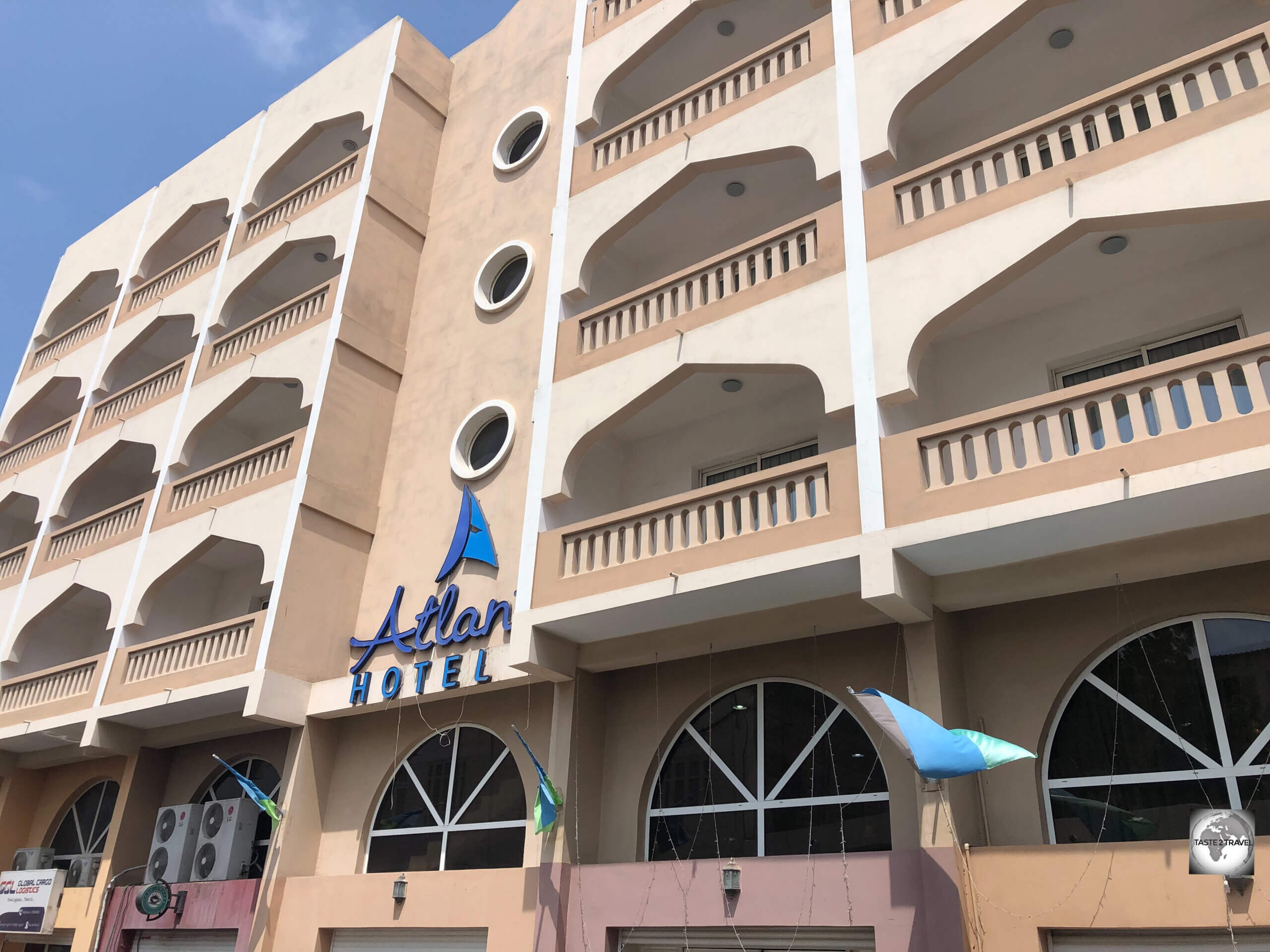
My residence during my stay in Djibouti City – the wonderful Atlantic Hotel.
During my stay in Djibouti City, I took up residence at the wonderfully comfortable Atlantic Hotel, which is located in the heart of the downtown area.

My room at the Atlantic Hotel in Djibouti City.
All of the dining options mentioned in the ‘Eating Out‘ section are located just a short stroll from this hotel.

A view of my room at the Atlantic Hotel in Djibouti City.
If you wish to stay in the heart of Djibouti city, the Atlantic hotel is a top choice.

Breakfast at the Atlantic Hotel in Djibouti City.
Rooms, which cost around US$160 per night can be booked on Booking.com and include a buffet breakfast.
The hotel also offers rental cars.
Djibouti Palace Kempinski

The Djibouti Palace Kempinski hotel is the first 5-star hotel in the Horn of Africa.
The first 5-star hotel in the Horn of Africa, the Djibouti Palace Kempinski hotel is a wonderful choice for those travelling on a business expense account or for those wishing to splurge.

The very quiet lobby of the Djibouti Palace Kempinski hotel.
With plush rooms starting at US$300 per night, this is the best choice in Djibouti City and the finest hotel anywhere in the region.

A view of the Djibouti Palace Kempinski hotel.
During my visit, the hotel seemed to be empty. I asked about occupancy and was told that it was low due to Ramadan.

The pool at the Djibouti Palace Kempinski is the most popular pool in town.
Even if you are not staying at the Djibouti Palace Kempinski, it is worth spending DJF 4,500 (USD$25) for a day pass for the swimming pool.
This is the best place in town to cool off, and, on the day of my visit, was popular with visiting French military personnel, who used their standard khaki-issued backpacks to carry their pool accessories.
Airbnb
Due to the number of expats living in Djibouti, there are many Djibouti apartments available for rent on Airbnb which can save you on the cost of accommodation and allow you to further reduce costs by self-catering.
If you are self-catering, the best places to shop for groceries are the Géant hypermarket, which is located inside Bawadi Mall (the only mall in town) or the Nougaprix supermarket which is located downtown.
Tip: When booking apartments on Airbnb, check the location. Some apartments are located well away from the centre, in the middle of quiet neighbourhood’s.
There’s no point staying somewhere which is far from the centre and requires expensive taxi rides whenever you wish to go anywhere.
Visa Requirements

My passport entry stamp for Djibouti.
All visitors to Djibouti must obtain either a visa on arrival to Djibouti, an electronic e-visa online or a visa from one of the Djiboutian diplomatic missions prior to arrival in Djibouti.
The one exception to this rule is Singaporean passport holders, who can enter Djibouti without a visa.
Tourist visas are valid for a stay of 30 days.
Djibouti Visa in Addis Ababa

My Djiboutian visa which was issued on the same day in Addis Ababa.
I applied for my Djibouti visa at the Djibouti Embassy in Addis Ababa where a single-entry tourist visa cost me US$35, payable in USD cash, and required one passport photo.
Thirty day tourist visas are issued the same day, with applications accepted until 12 noon. The embassy then closes for lunch, then reopens at 1:30 pm at which time you can collect your passport. The staff are friendly and helpful.

My Djibouti visa receipt from the Djibouti embassy in Addis Ababa.
Letter of Invitation
I was not asked for a letter of invitation when I applied for my visa at the embassy – but – I was asked for my letter of invitation by immigration upon arrival at Djibouti airport.
Since I didn’t have a letter of invitation, I was asked to wait – along with most other foreigners from the flight. Eventually, a 2nd immigration officer stamped an entry stamp into my passport and welcomed me to Djibouti.
The contact details of the Djibouti Embassy in Addis Ababa are:
Address
Addis Ababa
Ethiopia
Phone
+251-116-613006
Fax
Getting There
Air
The easiest and most common way to get to Djibouti is by air.
Djibouti–Ambouli International Airport is the only airport in Djibouti. Located 6 kilometres (4 miles) south of downtown, the airport is currently undergoing a complete rebuild (March 2023). As such, everything is a mess and there are currently no shops, services or anything else available.
The airport also serves as a joint civilian/military-use airport. When my Ethiopian Airlines flight taxied to the terminal, we parked next to a group of uniformed soldiers who were unloading large assault rifles from various shipping containers and laying them out on the tarmac. Military stock-taking?
The following airlines provide scheduled flights to/ from Djibouti:
- Air Djibouti – flies to/from Addis Ababa, Aden, Dire Dawa, Hargeisa, Mogadishu
- Air France – flies to/from Paris–Charles de Gaulle
- Ethiopian Airlines – flies to/from Addis Ababa, Dire Dawa
- flydubai – flies to/from Dubai–International
- Jubba Airways – flies to/from Bosaso, Hargeisa, Jeddah
- Kenya Airways – flies to/from Addis Ababa, Nairobi–Jomo Kenyatta
- Qatar Airways – flies to/from Doha
- Saudia – flies to/from Jeddah
- Turkish Airlines – flies to/from Istanbul
- Yemenia – flies to/from Aden
Airport Transport
Taxis are available outside the terminal.
I was fortunate to meet some friendly locals who offered to drive me to my downtown hotel – a wonderful introduction to the country. The Djiboutian’s are so friendly and kind!
Land
Djibouti shares borders with Eritrea, Ethiopia, and Somalia, but travel overland can be challenging due to poor road conditions, security risks, and the need for permits and visas.
Currently the land border between Djibouti and Eritrea is closed while the borders between Djibouti and Ethiopia and Somalia (Somaliland) are open.
However, the newly constructed Addis Ababa-Djibouti railway line provides a convenient and safe way to travel between Ethiopia and Djibouti.
Somaliland

A Somaliland-registered 4WD being readied for its overnight journey from Djibouti City to Hargeisa.
4WD vehicles for Hargeisa (capital of Somaliland) depart each evening at around 5 pm from Avenue 26 in Djibouti City. The cost of a seat up front, next to the driver, is USD$40, while those behind cost US$30.
There is no fixed office for these Somaliland ‘taxis’, they simply park alongside the roadside on Avenue 26. Any taxi driver in Djibouti knows where to find them and you should arrange transportation the day before.

Somaliland 4WD’s on Avenue 26 are easily identified by their Somaliland license plates.
There are many vehicles making this journey each evening, with all 4WD’s being 1990’s-era Toyota Land Cruisers. They are beat up, well past their expiry date and prone to breakdowns in the Somali dessert in the middle of the night. All part of the adventure!
The 562 km journey is entirely on unsealed roads (except for the first 20 km inside Djibouti) with a total journey time of 17 hours. This includes a 4-hour stop at the border.
Most of the journey is done during the night, when it is cooler in the desert.
The Somali drivers, who drive like there is no tomorrow, speed along the sandy/ gravel/ rutted tracks at truly dangerous speeds in the darkness of night. The locals in my car kept asking the driver to slow down. They were afraid for their lives!
This is a long, enduring, uncomfortable, and at times plain scary, journey!
More coverage on this in my Somaliland Travel Guide.

My beautiful Osprey travel bag, covered in desert dust and crushed under a heavy white sack.
Tip:
Prior to your main bag (backpack) being strapped onto the roof of the 4WD, you should remove anything valuable or breakable, including all toiletries. Your bag will be crushed under the weight of boxes and other heavy items.
Also at the border, you will be separated from anything on the roof of your vehicle for about 4 hours.
Getting Around
Public transport in Djibouti consists mainly of minibuses that are privately owned, with no known schedule.
Taxis are also numerous and inexpensive with most rides around Djibouti City costing between DJF 500 – 1,000 (USD$2,80 – $5.60).
Taxi
Taxis in Djibouti tend to look like beat up dodgem cars. A taxi fare around Djibouti city should cost DJF 500, with longer journeys costing up to DJF 1,000.
Rental Car

Djibouti car license plates display numbers and numerals in Latin and Arabic characters.
The Atlantic Hotel offers rental cars starting a USD$50 per day.
That’s the end of my travel guide for Djibouti. If you wish to comment, please feel free to leave a message below.
Safe Travels!
Darren
Further Reading
You might be interested in reading my:
Author: Darren McLean
Darren McLean is an Australian, full-time, digital nomad who has spent 37 years on a slow meander around the globe, visiting all seven continents, 192/ 193 UN countries and 245/ 251 UN+ countries and territories.
He founded taste2travel to pique one’s curiosity and inspire wanderlust.








Thank you Darren ! your Djibouti’s article gives a lot of useful practicals informations (1). We can add many other interesting sites to be visited. On the city of Djibouti itself, there is also the markets and the lively districts of Balbala and Arihba; Lac Abbé is a site to be discovered absolutely. Others sites are worth a visit: towns of Tadjourah and Obock, the Grand bara desert where you can do sand-yachting, the Godoria mangrove, the coastal camps (Sables Blancs, Ras Ali, Ras Bir…), the mountainous and green of Goda mountains with their villages and camps, the underwater seabed for snorkeling, whale-sharks, terrestrial and endemic fauna…
(1) prices to go Lac Abbé: vehicule, driver and guide for 395 $ for a group of 1 to 4 persons, and add 82 $ by person for half board at camp of Lac Abbé and 2 lunches at the restaurant on return journey (contact AFRICORNE TRAVEL for more informations)
The validity period of SIM card is unlimited as long as you use it; with your SIM card you can buy internet forfaits for 1, 3 or 7 days or for one month
Hi Alain,
Many thanks for your feedback…
Next tine I visit Djibouti, I’ll organise a tour with Africorne travel.
Regards,
Darren
You are welcome Darren, see you soon, Inch’allah !
Alain
If you want to discover extraordinary sites, new cultures, outside of mass tourism? then travel to Djibouti. You can take a camel excursion between Lake Abbé and Lake Assal, meet the whale shark, have tea or spend the night with a nomadic family, hike in the Goda or Mabla mountains from one village to another. , sleep at Lake Abbé, swim or sleep at Lake Assal, go sand yachting in the Grand Bara desert, observe dazzling underwater flora and fauna while snorkeling… For more information, contact Africorn Travel https:/ /africa-horn-travel.com/